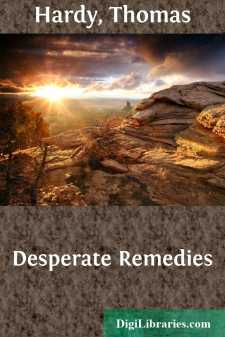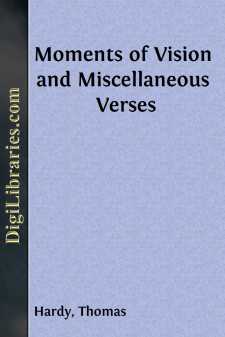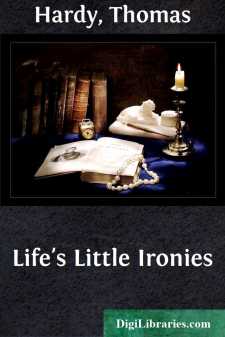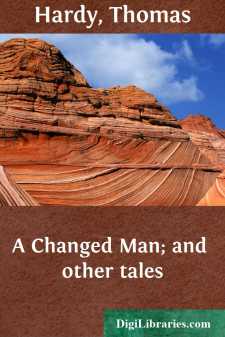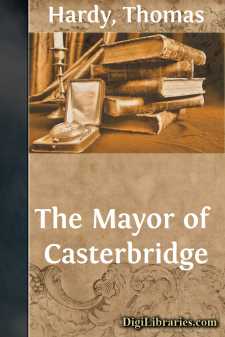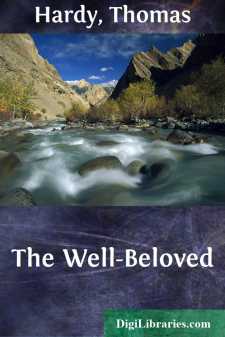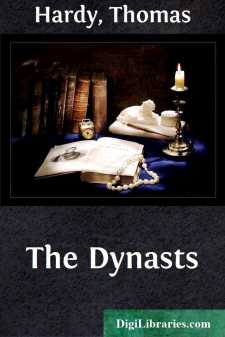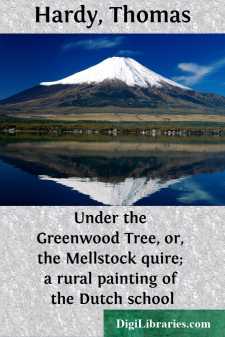Categories
- Antiques & Collectibles 13
- Architecture 36
- Art 48
- Bibles 22
- Biography & Autobiography 813
- Body, Mind & Spirit 142
- Business & Economics 28
- Children's Books 17
- Children's Fiction 14
- Computers 4
- Cooking 94
- Crafts & Hobbies 4
- Drama 346
- Education 46
- Family & Relationships 57
- Fiction 11829
- Games 19
- Gardening 17
- Health & Fitness 34
- History 1377
- House & Home 1
- Humor 147
- Juvenile Fiction 1873
- Juvenile Nonfiction 202
- Language Arts & Disciplines 88
- Law 16
- Literary Collections 686
- Literary Criticism 179
- Mathematics 13
- Medical 41
- Music 40
- Nature 179
- Non-Classifiable 1768
- Performing Arts 7
- Periodicals 1453
- Philosophy 64
- Photography 2
- Poetry 896
- Political Science 203
- Psychology 42
- Reference 154
- Religion 513
- Science 126
- Self-Help 84
- Social Science 81
- Sports & Recreation 34
- Study Aids 3
- Technology & Engineering 59
- Transportation 23
- Travel 463
- True Crime 29
Thomas Hardy
Thomas Hardy (1840-1928) was an English novelist and poet, known for his depiction of the rural life and social issues in the Victorian era. His notable works include "Tess of the d'Urbervilles," "Far from the Madding Crowd," and "Jude the Obscure," which often explore themes of fate, love, and the struggle against societal constraints. Hardy's writing is characterized by its rich, descriptive style and profound pessimism, reflecting his belief in the indifferent nature of the universe.
Author's Books:
Sort by:
by:
Thomas Hardy
1. DECEMBER AND JANUARY, 1835-36 In the long and intricately inwrought chain of circumstance which renders worthy of record some experiences of Cytherea Graye, Edward Springrove, and others, the first event directly influencing the issue was a Christmas visit. In the above-mentioned year, 1835, Ambrose Graye, a young architect who had just begun the practice of his profession in the midland town of...
more...
by:
Thomas Hardy
AN UPBRAIDING Now I am dead you sing to me The songs we used to know,But while I lived you had no wish Or care for doing so. Now I am dead you come to me In the moonlight, comfortless;Ah, what would I have given alive To win such tenderness! When you are dead, and stand to me Not differenced, as now,But like again, will you be cold As when we lived, or how? "These...
more...
by:
Thomas Hardy
THE SON’S VETO CHAPTER I To the eyes of a man viewing it from behind, the nut-brown hair was a wonder and a mystery. Under the black beaver hat, surmounted by its tuft of black feathers, the long locks, braided and twisted and coiled like the rushes of a basket, composed a rare, if somewhat barbaric, example of ingenious art. One could understand such weavings and coilings being wrought to last...
more...
by:
Thomas Hardy
King’s-Hintock Court (said the narrator, turning over his memoranda for reference)—King’s-Hintock Court is, as we know, one of the most imposing of the mansions that overlook our beautiful Blackmoor or Blakemore Vale. On the particular occasion of which I have to speak this building stood, as it had often stood before, in the perfect silence of a calm clear night, lighted only by the cold shine...
more...
by:
Thomas Hardy
CHAPTER I The person who, next to the actors themselves, chanced to know most of their story, lived just below ‘Top o’ Town’ (as the spot was called) in an old substantially-built house, distinguished among its neighbours by having an oriel window on the first floor, whence could be obtained a raking view of the High Street, west and east, the former including Laura’s dwelling, the end of the...
more...
by:
Thomas Hardy
1. One evening of late summer, before the nineteenth century had reached one-third of its span, a young man and woman, the latter carrying a child, were approaching the large village of Weydon-Priors, in Upper Wessex, on foot. They were plainly but not ill clad, though the thick hoar of dust which had accumulated on their shoes and garments from an obviously long journey lent a disadvantageous...
more...
by:
Thomas Hardy
1. I. A SUPPOSITITIOUS PRESENTMENT OF HER A person who differed from the local wayfarers was climbing the steep road which leads through the sea-skirted townlet definable as the Street of Wells, and forms a pass into that Gibraltar of Wessex, the singular peninsula once an island, and still called such, that stretches out like the head of a bird into the English Channel. It is connected with the...
more...
by:
Thomas Hardy
CHAPTER I. The rambler who, for old association or other reasons, should trace the forsaken coach-road running almost in a meridional line from Bristol to the south shore of England, would find himself during the latter half of his journey in the vicinity of some extensive woodlands, interspersed with apple-orchards. Here the trees, timber or fruit-bearing, as the case may be, make the wayside hedges...
more...
by:
Thomas Hardy
The Spectacle here presented in the likeness of a Drama is concerned with the Great Historical Calamity, or Clash of Peoples, artificially brought about some hundred years ago. The choice of such a subject was mainly due to three accidents of locality. It chanced that the writer was familiar with a part of England that lay within hail of the watering-place in which King George the Third had his...
more...
by:
Thomas Hardy
PREFACE This story of the Mellstock Quire and its old established west-gallery musicians, with some supplementary descriptions of similar officials in Two on a Tower, A Few Crusted Characters, and other places, is intended to be a fairly true picture, at first hand, of the personages, ways, and customs which were common among such orchestral bodies in the villages of fifty or sixty years ago. One is...
more...


